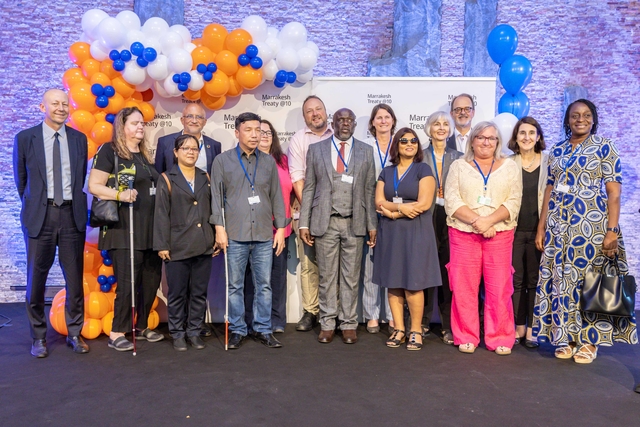Celebrations were held at the World Intellectual Property Organization (WIPO) during the Assemblies of the Member States (the annual meeting where WIPO reports to Member States on its Activities and adopts budgets), with the Accessible Books Consortium (ABC) and its members, alongside Member States and stakeholders coming together to commemorate the treaty, its history, and its impact. In his opening speech, Director General Daren Tang affirmed the treaty as WIPO’s fastest growing treaty, “well on its way to becoming a global Treaty.”
The keynote speakers included President of the World Blind Union Martine Abel-Williamson, who highlighted the pivotal role of the WBU in advocating for the adoption of the treaty. She recalled libraries being unable to keep up transcribing the books that she needed, and how her mother would stay up, late in the night, reading books into a cassette tape for her. Wishing these struggles to be a thing of the past, she addressed that the “gap between ratification and implementation” is concerning, as it prevents blind and partially sighted individuals from exercising their fundamental right to access information.”
Likewise, Dang Hoai Phúc, the Executive Director of the Sao Mai Center for the Blind in Vietnam, recalled, “for every one hour spent in class, I needed to spend an additional two hours to get the accessible material for that session.” He celebrated the Treaty, as it “facilitates cross-border accessible books exchange, wherein authorized entities like us can join the ABC Global Books Service as well as exchange with our existing networks.”
Former IPA President and the current president of the Mexican Publishers Association, CANIEM, Hugo Setzer, expressed both the IPA’s and publishers’ support for accessibility, and quoted former IPA President YS Chi’s words from the Marrakesh Conference, that “every single book we publish should be accessible for all.” He stressed the need for unity amongst publishers to ensure accessibility, and to be “convinced” on the need to work on “accessible publishing.” Ultimately, he called for a path “towards a more equitable and accessible world.”
Dr. Praveena Sukhraj-Ely, Chief Director of Governance and Compliance at the Department of Women, Youth and Persons with Disabilities at the Office of the Presidency in South Africa, called the adoption of the treaty a “watershed moment in the journey to access, inclusion, and participation for people with visual and print disabilities.” She stressed that through the “wonderful developments in mainstream and access technology” seen in the last 10 years, “it is imperative that we maximise these innovations to develop a holistic affordable solution to ensure that at the 20th anniversary celebrations all people with visual and print disabilities are empowered.”
British children’s author and poet Tony Bradman also highlighted “the miracle of the agreement” of the Marrakesh Treaty, and the power it can bring to ensure “access to one of the most important resources in the world – the written word.”
The celebrations were also the occasion for the Accessible Books Consortium Board to meet face-to-face for the first time since the Covid-19 Pandemic. They were able to discuss updates on ABCs work as well as the work of the 3 constituencies that make up the board: rightsholders, people with print disabilities and authorised entities. The group also discussed how to improve visibility of accessibility metadata, potential partnerships, the ABC Accessible Publishing Charter (more here), and the ABC International Excellence Awards (nominations open here) the The rightsholders representatives are Luke Alcott (IAF), José Borghino (IPA), Laura Brady (eBound Canada, and co-chair of IPA’s Accessibility Working Group), Samantha Holmann (IFRRO), and Hugo Setzer (Manual Moderno, Past IPA President, co-Chair of the IPA’s Accessibility Working Group).
You can read Hugo’s blog post on the occasion here, and more about the day’s events here and explore photos here!

